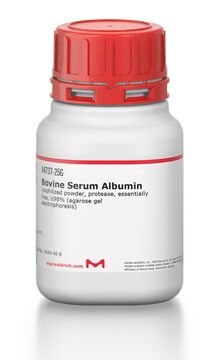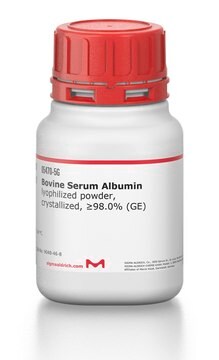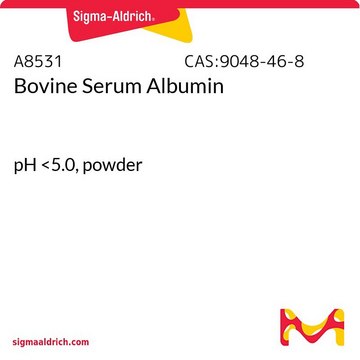A4612
Bovine Serum Albumin
lyophilized powder, Essentially fatty acid free
Synonym(s):
Albumin from bovine serum, Albumin bovine serum, BSA, Bovine albumin
Sign Into View Organizational & Contract Pricing
All Photos(4)
About This Item
Recommended Products
biological source
bovine
Assay
≥98% (agarose gel electrophoresis)
form
lyophilized powder
mol wt
~66 kDa
packaging
poly bottle of
origin
New Zealand origin
technique(s)
ELISA: suitable
cell culture | mammalian: suitable
impurities
≤0.01% free fatty acid (GC)
pH
4.8-7.5
solubility
H2O: soluble 40 mg/mL
UniProt accession no.
storage temp.
2-8°C
Gene Information
bovine ... ALB(280717)
Looking for similar products? Visit Product Comparison Guide
General description
Bovine serum albumin (BSA) is an α-helical, globular and non-glycosylated 66kDa protein. It is characterized with three domains with two subdomains under each. BSA belongs to the serum albumins family and has 17-disulfide bonds.
The most abundant plasma protein in mammals is albumin. It is produced in the liver and transferred as a non-glycosylated protein into the plasma. This multifunctional protein has an amazing ability to bind to ligands.
Application
Bovine Serum Albumin has been used as a component of Tris-buffered saline (TBST) to stabilize polyvinylidene fluoride (PVDF) membranes during western blotting. It has also been used in along with phosphate-buffered saline with tween detergent (PBST) as a blocking buffer in enzyme linked immunosorbent assay(ELISA).
Bovine serum albumin (BSA) is extensively used for drug delivery since it is widely available, cheap and easily purified, has ligand-binding properties, and is widely accepted in the pharmaceutical industry.
Biochem/physiol Actions
Albumin is the most important circulatory protein involved in the control of Ca2+ (and Mg2+) levels in mammals.
Bovine Serum Albumin (BSA) is a transporter for drugs, hormones and fatty acids. It is used as a blocking agent in enzyme linked immunosorbent assay (ELISA) for preventing non-specific binding of antigens and antibodies to the microtiter plates. BSA is a crucial component of the cell culture media and favors embryonic stem cells (hESC) differentiation. BSA shares structural features with human serum albumin. Its high solubility, low cost and purity and interaction with surfactant is exploited in cosmetic and pharmaceutical industry.
Certain conformational and primary-sequence epitopes of BSA are suspected allergens in human beef and milk allergies.
Features and Benefits
- Essentially fatty acid-free
- Sourced and manufactured in New Zealand
- Prepared by chromatography
Preparation Note
Serum albumin may be referred to as Fraction V. This naming convention is taken from the original Cohn method of fractionating serum proteins using cold ethanol precipitation. Serum albumin was found in the fifth ethanol fraction using Cohn′s method. Since then, the term "Fraction V" has been used by some to describe serum albumin regardless of the method of preparation. Others have used this term to describe serum albumin purified by ethanol fractionation methods that have been highly modified since the original Cohn method was described. Sigma-Aldrich manufactures and distributes serum albumins purified from a variety of primary methods including the true Cohn fractionation method, modified ethanol fractionation methods, heat shock and chromatography. Additional purification steps may include crystallization or charcoal filtration.
Storage Class Code
11 - Combustible Solids
WGK
WGK 3
Flash Point(F)
Not applicable
Flash Point(C)
Not applicable
Choose from one of the most recent versions:
Already Own This Product?
Find documentation for the products that you have recently purchased in the Document Library.
Customers Also Viewed
Inhibition of the fibrillation of highly amyloidogenic human calcitonin by cucurbit [7] uril with improved bioactivity
Shang H, et al.
Acta Biomaterialia, 78, 178-188 (2018)
Targeting the PI3K/AKT pathway via GLI1 inhibition enhanced the drug sensitivity of acute myeloid leukemia cells
Liang H, et al.
Scientific reports, 7, 40361-40361 (2017)
Lin Luo et al.
Journal of leukocyte biology, 107(2), 251-262 (2019-08-31)
In innate immune cells, pathogens and danger signals activate TLRs, unleashing potent and tailored inflammatory responses. Previously, we reported that an immune-specific transmembrane adaptor, SLP adaptor and CSK interacting membrane protein (SCIMP), interacts with TLR4 via direct binding to its
Yuangang Zu et al.
International journal of nanomedicine, 8, 1207-1222 (2013-04-10)
The livertaxis of glycyrrhizic acid-conjugated bovine serum albumin (GL-BSA) has been reported in the literature. Now, in this paper, we describe a novel type of drug-targeted delivery system containing 10-hydroxycamptothecin (HCPT) with liver tumor targeting. First, GL was coupled to
Heather E Fice et al.
Genes, 10(7) (2019-07-25)
Telomeres are repeat regions of DNA that cap either end of each chromosome, thereby providing stability and protection from the degradation of gene-rich regions. Each cell replication causes the loss of telomeric repeats due to incomplete DNA replication, though it
Our team of scientists has experience in all areas of research including Life Science, Material Science, Chemical Synthesis, Chromatography, Analytical and many others.
Contact Technical Service






